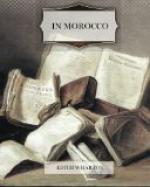[Footnote A: Moulay-Ismael was a learned theologian and often held religious discussions with the Fathers of the Order of Mercy and the Trinitarians. He was scrupulously orthodox in his religious observances, and wrote a treatise in defense of his faith which he sent to James II of England, urging him to become a Mahometan. He invented most of the most exquisite forms of torture which subsequent Sultans have applied to their victims (see Loti, Au Maroc), and was fond of flowers, and extremely simple and frugal in his personal habits.]
The empire fell apart as usual, and no less quickly than usual, under his successors; and from his death until the strong hand of General Lyautey took over the direction of affairs the Hassanian rule in Morocco was little more than a tumult of incoherent ambitions. The successors of Moulay-Ismael inherited his blood-lust and his passion for dominion without his capacity to govern. In 1757 Sidi-Mohammed, one of his sons, tried to put order into his kingdom, and drove the last Portuguese out of Morocco; but under his successors the country remained isolated and stagnant, making spasmodic efforts to defend itself against the encroachments of European influence, while its rulers wasted their energy in a policy of double-dealing and dissimulation. Early in the nineteenth century the government was compelled by the European powers to suppress piracy and the trade in Christian slaves; and in 1830 the French conquest of Algeria broke down the wall of isolation behind which the country was mouldering away by placing a European power on one of its frontiers.
At first the conquest of Algeria tended to create a link between France and Morocco. The Dey of Algiers was a Turk, and, therefore, an hereditary enemy; and Morocco was disposed to favour the power which had broken Turkish rule in a neighbouring country. But the Sultan could not help trying to profit by the general disturbance to seize Tlemcen and raise insurrections in western Algeria; and presently Morocco was engaged in a Holy War against France. Abd-el-Kader, the Sultan of Algeria, had taken refuge in Morocco, and the Sultan of Morocco having furnished him with supplies and munitions, France sent an official remonstrance. At the same time Marshal Bugeaud landed at Mers-el-Kebir, and invited the Makhzen to discuss the situation. The offer was accepted and General Bedeau and the Caid El Guennaoui met in an open place. Behind them their respective troops were drawn up, and almost as soon as the first salutes were exchanged the Caid declared the negotiations broken off. The French troops accordingly withdrew to the coast, but during their retreat they were attacked by the Moroccans. This put an end to peaceful negotiations, and Tangier was besieged and taken. The following August Bugeaud brought his troops up from Oudjda, through the defile that leads from West Algeria, and routed the Moroccans. He wished to advance on Fez, but international politics interfered, and he was not allowed to carry out his plans. England looked unfavourably on the French penetration of Morocco, and it became necessary to conclude peace at once to prove that France had no territorial ambitions west of Oudjda.




